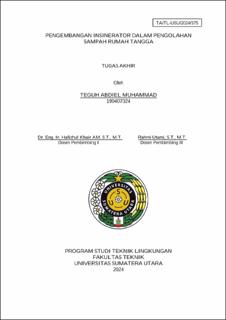Pengembangan Insinerator dalam Pengolahan Sampah Rumah Tangga
Development of Incinerator for Household Waste Processing

Date
2024Author
Muhammad, Teguh Abdiel
Advisor(s)
Khair, Hafizhul
Utami, Rahmi
Metadata
Show full item recordAbstract
Global environmental issues, especially waste management in Indonesia, highlight the high national waste production that is not managed optimally. Incineration is an effective alternative method to reduce waste volume, remove toxins, and produce further usabel products. However, previous studies have shown uneven temperatures in the combustion chamber, causing some waste to remain unburned. Therefore, this research aims to develop an improved incinerator by adding and enhancing its components to improve performance and operational efficiency. The design methodology involves initial testing of the combustion chamber to collect primary data. This data serves as a basis for comparison in developing the incinerator design. The incinerator design development is conducted using Autodesk Fusion 360 and Autodesk CFD software, involving design and simulation stages to optimize performance and minimize risks before implementation. The results of the incinerator development design show the addition of conductors in the form of 0.9 cm diameter copper pipes, each 72 cm long, placed 3 pieces at each corner of the combustion chamber. These added copper pipes effectively store and distribute heat, especially at the corners of the combustion chamber. Additionally, galvanized and copper pipes are added to the air blower to improve air distribution within the combustion chamber. Test results indicate a significant improvement in the incinerator's combustion chamber specifications for household waste processing compared to the previous version. These improvements include shorter burning times, higher efficiency and combustion rates, as well as reduced consumption of diesel fuel, electricity, and operational costs. The incinerator can burn 17.5 kg of waste in approximately 40 minutes at temperatures of 670-≥ 850°C, achieving a combustion efficiency of 91.7%. The energy consumption required is 6.6 liters of diesel fuel and 9,539 kWh, with operational costs ranging from Rp 60,154 to Rp 113,944 per 17.5 kg of waste
Collections
- Undergraduate Theses [404]
